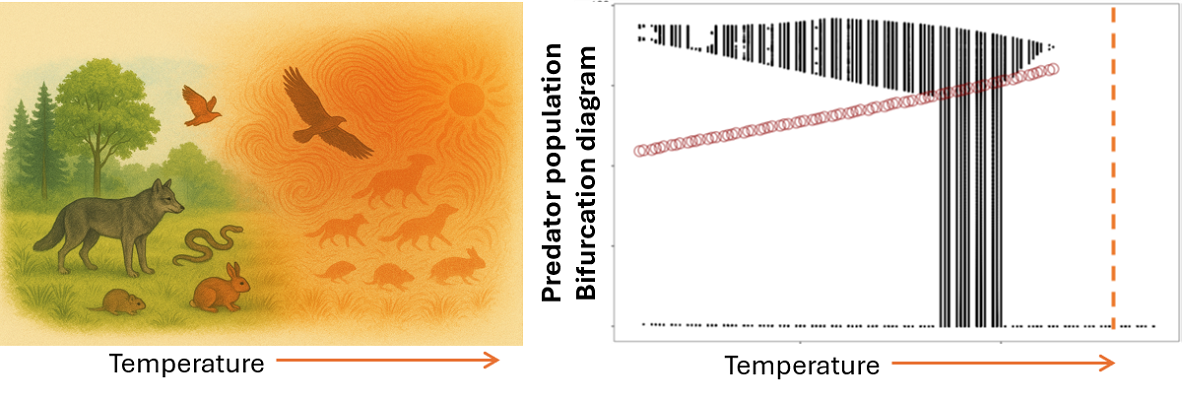How rising temperatures can destabilise ecosystems
– Shravani Deoghare

(Image: Karthik Murthy (part of image created using ChatGPT))
Global warming is reshaping ecosystems worldwide, often in unprecedented ways. With the Earth’s average temperature having increased by about 1°C over the last century, understanding how this affects species interactions is essential for predicting, and potentially mitigating, large-scale extinctions.
A recent study from IISc used computational simulations to examine how current global warming trends influence these interactions within a three-tier food chain (resource-consumer-predator). The researchers modelled how the populations at these three levels vary over time in response to temperature increases.
They found that temperature changes (under 3°C) can cause diverse patterns of population growth, especially in predators. Typically, when temperatures are stable and favourable, predator populations can fluctuate, but within limits – a pattern called chaotic oscillation. However, if temperatures slowly increase over time, the system passes through a short “transient chaos” phase – when predator populations show chaotic oscillations for a short duration – after which the predator population collapses entirely.
Crucially, the study also compared the effects of warming on tropical and temperate biomes. Despite experiencing a lower temperature rise, tropical systems were found to be far more vulnerable, with predator populations predicted to collapse at lower thresholds.
To address these extinction risks, the researchers tested a management approach called partial control, in which predator species are periodically reintroduced into the ecosystem during the transient chaos phase. While this can prolong coexistence, the study found that it only delays the inevitable: continued warming will likely lead to eventual predator collapse.
The study offers a new framework for understanding how small-scale warming trends affect complex species networks. It highlights the importance of incorporating bio-energetics (how energy is utilised in biological processes) while studying ecosystems’ vulnerability to environmental changes – particularly global warming – and can help guide future conservation efforts.
REFERENCE:
Murthy KK, Kumar KS, Seshadri AK, Effect of current global warming trends on temperature-sensitive tri-trophic interactions, Ecological Complexity (2025).
https://www.sciencedirect.com/science/article/pii/S1476945X25000236
LAB WEBSITE:
http://dccc.iisc.ac.in/aks/aks.html




